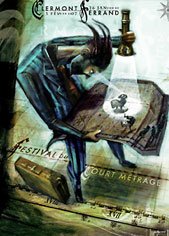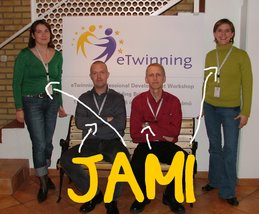

This a picture of a group of students from a Polish school - form 1f. It's a wonderful group of people who love mathematics and economics. Apart from that, they enjoy using English, and German. Unfortunately they don't understand French (yet:-) All of them hope to make new friends and learn about Christmas celebrations in other countries.



6 comments:
Hi!
My name is Nicolas and i'm from belgium.My school is "Sainte-Julienne".
I am in 6th secondary, my last years in sociology.I find your classe brilliant and that there are very pretty girls.
KOLĘDNICY
During Advent, the Gwiadorze or star carriers, used to begin wandering through the towns and villages and this would continue until Epiphany. Some of the Gwiadorze sang carols, others recited verses or put on Szopi or puppet show, or herody or nativity scenes. The last two customs are developments from traditional manger scenes or Jaselka or crib. Star carriers are called carol singers. They sing carols. "put on Szopi" - you rather meant "perform Szopke". It is scene when Chist is born, and three kings come to the manger. "Herody" - you mean Herod's performance. The story, about evil king Herod, who was forseen to loose his power from a child, so he ordered to kill all the childs. Jaselka=Szopka. It is the same performance.
Traditional Recipes Dishes From Poland...
Uszka Z Grzybami
(Mushroom pockets)
1/2 tsp. salt
1/2 cup cold water
1 egg, beaten
2 cups sifted flour
Make dough of the above ingredients and roll out on floured board. Cut into 3-inch squares. Place a teaspoon of stuffing (see recipe) on squares.
Fold diagonally into triangles. Press edges together. Fold triangle once more to form a "sow's ear" and press edges together. Drop into salted boiling water. Cook for 10 minutes or until pockets float on top of water.
Stuffing Mix
1 med. onion, chopped
2 tbls. butter
Salt and pepper
Mushrooms, cooked and chopped, which have been removed from vegetables broth in recipe above. Brown chopped onions in butter. Add breadcrumbs and fry for 2 minutes. Season to taste and mix with chopped mushrooms.
KLUSKI Z MAKIEM
(Noodles with Poppy Seeds)
3 tbls. poppy seeds
3 tbls. sugar
1 package wide noodles
2 tbls. Butter
Scald poppy seeds with boiling water and soak for 3 hours. Drain. Force through food grinder and mix with sugar. Cook noodles in lightly salted water. Drain and rinse with cold water. Place in baking dish and heat in oven for several minutes. Mix with butter and poppy seeds and server hot.
St. Nicholas Day
The first sign of coming holidays In Poland is ST. Nicholas Day (12/6). On this day, one person was selected to represent St. Nicholas and was driven on a sleigh to the homes in a Polish village. He was dressed in a long white robe, bishop’s mirth, long white beard and held a shepherd’s staff. Children who were good during the year received gingerbread cookies, apples and small toys. Children, who were bad, received twigs as a punishment. Children and adults alike still exchange small gifts on this day.
Christmas Eve
Origin
Wigilia comes from the Latin word vigiliare, which means to watch. In Poland, the word Wigilia used to be known as the day before a feast, and now it means the day before Jesus’s birth.
Superstition
Supper started when the first star appeared on the sky. Menu for this occasion was traditional, unchanging, and very carefully planned. It contained only food from forest, fields, lakes, and orchards. Meat was not allowed on Wigilia. An even number of people was seated at supper table. Number 13 was especially avoided; sign of death in coming year, and every effort was made to invite someone to share the supper – an orphan, stranger, or any single person.
l waited a moment of breaking and sharing Oplatek – a thin wafer. The host and hostess faced one another, then broke and shared a part of the other's wafer. They wished each other fulfillment of their wishes. Then they broke and shared the oplatek with each person present.
Dishes
The number of dishes served on Wigilia depended on the wealth of the family - five, seven, nine, eleven or thirteen. Uneven number of dishes was to bring harvest and good luck in the following year. Supper started with a choice of a mushroom soup, red beet soup with little dumplings, or almond soup. Next came sauerkraut with mushrooms with different kinds of filling, potatoes, and noodles with poppy seed. Then several kinds of fish prepared differently – marinated, fried, or broiled - were brought to the table. Dessert consisted of poppy seed with honey, nuts and raisins, fruit compote, and gingerbread cookies or cakes; as well as famous krupnik – holiday brandy made out of honey, spices, and alcohol. After supper candles were lit on a tree and gifts exchanged.
At midnight
At midnight, people went to Pasterka or Midnight Mass. Everybody attended except infants and very sick. After the sermon, the entire congregation sung Koledy or Christmas Carols.
On the way back from the mass, men visited the homes of relatives and neighbors. Sometimes a young man visited the home of a young woman whom he liked. Playfully he would snatch an apple from a Christmas tree. If the woman allowed him to keep the apple, he could begin his courting her. The host had appetizers ready for the guests, including krupnik and hot tea.
Christmas Day
This day was spent quietly within the intimate family; visiting with friends and relatives would begin the following day, St. Stephen's day.
Christmas day was traditionally free of unnecessary work. The menu concentrated on meat, which is probably why the most popular dish on this day was bigos or hunter's stew. This dish can and should be prepared ahead of time.
St. Stephen's Day
This day spent on visiting relatives and friends is the second day of Christmas, which is also celebrated as a holiday in Poland. After mass, people threw wheat or rice at each other, to ensure good harvest and wealth in coming year.
On this day domestic help was hired or rehired for the coming year and the hostess prepared an excellent meal for her domestic staff. When one of the staff left the table and did not eat, he indicated he was leaving for employment somewhere else. For the rest of the staff a new contract was sealed for the following year.
I'm Marlena from Poland. You know, in Poland are only pretty girls:-), but yours girls (and boys) are pretty to.
Christmas in Poland…
Polish Christmas has many traditions. In Poland we have Christmas Eve. It is on December 24th . It is a very important day for Polish Christian people. On this day families decorate Christmas tree-fir or pine tree with paper stars, angels, toys, nuts and glass balls. When the first star appears in the sky, people take their seat at the Christmas table. They share wafer and wish one another the best wishes like: good health, luck, big money etc. They leave an empty place for an unexpected guest. Traditionally dishes should be twelve. The most popular dishes are red borsch, pies and sour cabbage with mushrooms, fish (usually carp) and pappy-seed cake. The interesting dish is kutia. In it there are nuts, honey, almonds, cooked wheat and dried fruit. There is also a custom of giving presents. At midnight many people go to church. The next day, on December 25, is Christmas-the families eat and talk again, sing carols and go to church. On Christmas we can eat meat. We eat salads, cakes, smoked meat, sausages, pate, roasted chicken or turkey filled with dried fruit and drink beetroot soup and good alcohol. The next day is St. Stephen’s day. It is on December 26. The families eat the rest of food, talk, visit friends with wishes, sing carols and go to church to remember St. Stephen. From that day the festivities begin.
Christmas is one of the most important awaited holidays in the year. Everyone loves it since this is a unique time when people try to be kind, friendly and generous to one another all over the world.
THE PREPARATIONS
Christmas is very important season in the Polish year. In reality in PolandAdvent begins the preparations to experience Christ’s birth. The four Sundays of Advent are said to represent the 4,000 years of waiting of Christ. In Advent are Roraty, the special church services being held every morning. During the Advent Polish are baking a lot of Christmas decorations. We bake gingerbread in a great variety of shapes including hearts, animals. The most popular of decorations are baubles, colourful paper chains and lots of electric lights. Beautifully light Christmas trees are placed in all public arenas ( in our city near churches, main streets) and in homes. Traditionally we decorate the Christmas trees ( in Polish -> choinka) with shiny apples, gift walnuts, wrapped chocolate shapes and many homemade candles. On the top of tree is a star or a glittering top piece.
In many schools are Jasełka, some scenes which present one of the most important time in Christ’s life, his birth and when the three kings come to the manger.
DURING THE CHRISTMAS EVE …
Christmas Eve ( in Polish -> Wigilia) is on December 24th, is a special part of the Polish Christmas, in fact, the most important rituals are celebrated on this day. Family members meet together in common supper. A traditional food found in Poland is opłatek
(wafer) which is piece of bread pressed with a holy picture on the surface. As each person shares the wafer, they would have to do two things: forgive any hurts that have occurred over past year and to wish the person all the happiness in the coming year :). Of course, it is more symbolic than real food. We celebrate with at least 12 vegetarian dishes like: kutia, it is a meal with nuts, honey, almonds, cooked wheat and dried fruit. Mniam:], carp (very important!), carp with mushrooms, mushroom soup, cabbage, beet soup with dumplings, stuffed dumplings, herrings with cream. In our homes we put on the table one plate for the one person who probably will come to us. That is one of the traditions. During the Christmas Eve we sing some carols, usually “ Silent Night, Holy Night”. After the most special meal in the Polish year we give some presents to each other. I like it so much ;] You know why. Late evening all family always go to the church on Midnight Mass.
Eelkaa ;]
Post a Comment